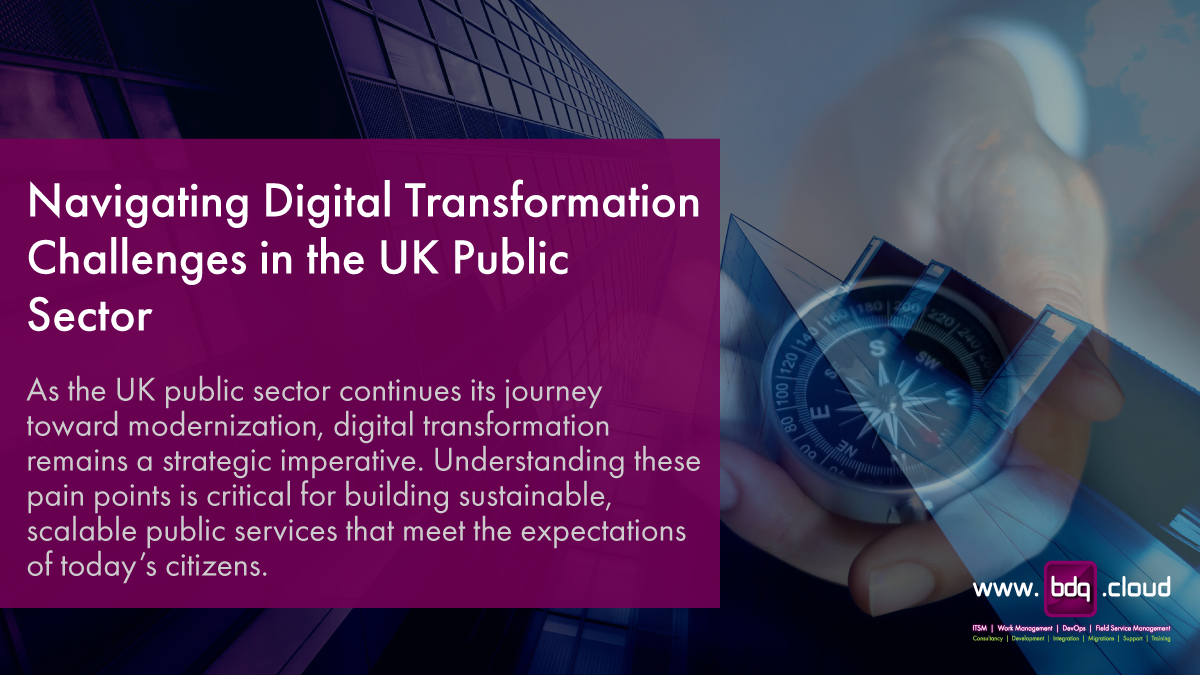8 min read
Navigating Digital Transformation Challenges in the UK Public Sector
By: BDQ Team on 24 Jun 2025

As the UK public sector continues its journey toward modernisation, digital transformation remains a strategic imperative. However, while progress has been made, many public sector organisations still grapple with deep-rooted challenges that hinder their ability to fully embrace modern digital solutions. Understanding these pain points is critical for building sustainable, scalable public services that meet the expectations of today’s citizens.
The 2025 State of Digital Government Review found that 25% of government services are “outdated” and 47% of services offered by central government are not digitised.
- Digital Transformation In Government | April 2025
1. Legacy Systems and Technical Debt
One of the most pressing digital transformation pain points for the UK public sector is the prevalence of legacy IT systems. Many departments still rely on outdated infrastructure, some of which date back decades. These systems are often expensive to maintain, poorly documented, and resistant to integration with newer technologies.
Legacy systems create bottlenecks in service delivery and restrict innovation. The lack of interoperability between platforms also makes it difficult to provide a unified, user-friendly experience for citizens. Moving to cloud-based, modular solutions is a long-term goal, but it requires careful planning and significant upfront investment.
2. Budget Constraints and Procurement Complexity
Despite strong political support for digital reform, public sector budgets remain under pressure. Departments must strike a balance between maintaining essential services and investing in digital innovation. Additionally, complex procurement frameworks and compliance requirements can slow down the adoption of new technologies.
These financial and procedural hurdles often result in delayed projects, short-term fixes, or the continued use of inefficient tools. Streamlining procurement and adopting more agile funding models are key to overcoming these challenges.
3. Skills Gaps and Workforce Modernisation
Digital transformation isn’t just about tools - it’s also about people. A persistent skills gap in digital and IT capabilities is limiting the UK public sector’s ability to implement and sustain transformation initiatives. Recruiting and retaining digital talent is particularly challenging given the competition from the private sector.
Upskilling existing staff and fostering a culture of digital literacy are essential. Public sector organisations must also modernise workforce practices, including flexible working models and cross-functional collaboration, to retain top talent.
🤔Did we miss something?
Are you working in the UK public sector and struggling with a digital transformation pain point that isn’t mentioned? Add to the conversation and leave a comment below! ⬇️

4. Data Silos and Security
Effective digital transformation depends on the ability to access and analyse data across departments. Unfortunately, data silos remain widespread in the public sector. This fragmentation limits visibility, stifles innovation, and hampers decision-making.
Moreover, the public sector must operate under rigorous data protection and cybersecurity standards. Balancing data accessibility with security and compliance is a significant challenge - particularly with the rise of remote work and hybrid service models.
5. User-Centric Service Design
Citizens now expect public services to offer the same seamless digital experiences they receive from the private sector. However, many government portals and internal systems are not built with user-centric design principles in mind.
Designing services around user needs - rather than organisational structures - requires a shift in mindset, the adoption of agile methodologies, and the use of feedback loops. Services must be accessible, inclusive, and responsive to changing public demands.
6. Change Resistance and Culture
Finally, digital transformation in the public sector often meets with organisational resistance to change. Long-standing processes, rigid hierarchies, and risk-averse cultures can slow down or even derail transformation efforts.
Addressing this challenge requires strong leadership, clear communication of benefits, and early involvement of staff in the design and rollout of digital initiatives. A culture of continuous improvement is crucial to building long-term resilience.
Looking Ahead
To succeed, the UK public sector must focus on scalable, interoperable platforms; prioritise digital skills development; and commit to service designs that put users first. By addressing these systemic challenges head-on, public organisations can deliver more efficient, responsive, and inclusive services for the future.
Need help navigating your digital transformation?
As part of our commitment to supporting the UK public sector, BDQ offers services through G-Cloud 14 and the Crown Commercial Service (CCS). This ensures that public sector organisations can procure our digital transformation, IT service management, and work management solutions efficiently and compliantly. By leveraging these frameworks, departments can access expert consultancy, implementation, and support services without the delays and complexity of traditional procurement processes, making it easier to meet transformation goals on time and within budget.

BDQ specialises in work management and ITSM solutions like GLPI, HaloITSM, Monday, Atlassian, Asana, and more, tailored to public sector needs. Get in touch, let’s talk about what you need.
Related Posts
Simple, fast, effective software rollout: BDQ Lightning Implementation
BDQ are proud to present its latest offering - the Lightning Implementation! If you know what you...
ITSM implementation from a customer perspective
ITSM has changed over the last 3 decades - just a bit about me. My name is Brad Hartman. My ITSM...
How monday sidekick is Changing Work Management with AI
Meet Your New AI Teammate! - Understanding Monday Sidekick and What It Means for Work Management.



